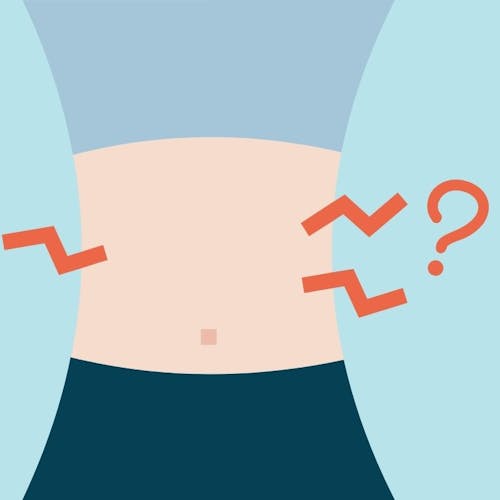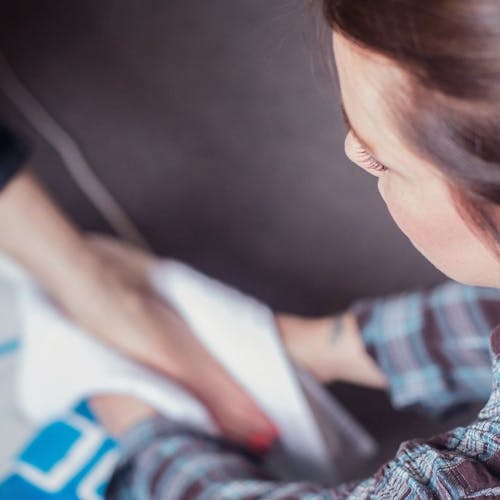This website uses cookies to enhance the user experience. By using Yoppie you are agreeing to our use of cookies.
PCOS Period Pain: Is It Really Worse?
Written by Yoppie
11 Feb 2022
What is PCOS?
How does PCOS affect periods?
How does irregular or heavy bleeding occur?
So could PCOS be what’s causing my painful periods?
What can I do about intense period pain?
How can I speed up the process of diagnosis?
PCOS has a lot to answer for, but whether its symptoms include worse period pain is up for debate. We’re taking a closer look at how PCOS affects menstruation, and answering the big questions; is this what’s making your period pain worse? What’s with the heavy bleeding and irregular menstruation? When is it time to see a doctor? Let’s dive in.
What is PCOS?
PCOS stands for polycystic ovary syndrome and it’s thought to affect around 1 in 10 people who menstruate in the UK. It’s when the ovaries contain harmless follicles that can grow up to 8mm in size. These are underdeveloped sacs where eggs grow, but in those with PCOS the eggs don’t always release, which means ovulation doesn’t always occur. The main feature of PCOS is irregular periods due to lack of ovulation, but could it be the cause of painful periods too?
How does PCOS affect periods?
One of the main symptoms of PCOS is having irregular periods or in some cases no periods at all. Some people with PCOS may also experience heavy bleeding during menstruation - the technical name for this is menorrhagia. It’s caused by low levels of progesterone associated with PCOS. But how much blood is too much, you ask?
Good question. Menorrhagia is often characterised by heavy bleeding that lasts more than 7 days, and while the average blood loss in a normal period is around 40ml, those with menorrhagia might pass more than 80ml of blood, and experience clots too.
How does irregular or heavy bleeding occur?
There are different intensities of PCOS, but if you have the condition, your cycle most likely works a little differently to others; each month, a follicle matures and is released by an ovary to be fertilised, but if you have PCOS you may have high levels of androgen hormones (like testosterone) which interfere with ovulation. This hormone imbalance causes the follicle not to develop or release, and instead it just stays put in the ovaries.
But what’s with the heavy bleeding? When ovulation doesn’t occur, the uterus doesn’t know it’s time to shed its lining, and so your period may not arrive on cue like it should. This looks different for everyone with PCOS, as some people experience a regular cycle with no issues and will bleed every 28 days, while others may only have a period every 30-40 days, making it much heavier. Or they may not get a period at all.
If you’re of the mindset that fewer periods is a good thing (who needs ‘em, right?!) you should still see a doctor if you are getting fewer than 8 or 9 periods a year, as this can negatively affect your long-term health.
So could PCOS be what’s causing my painful periods?
PCOS is known to make periods heavier, irregular, or disappear entirely, and produce what’s considered a ‘normal’ level of period pain from cramps, but there’s little research on whether or not it’s the cause of severe period pain. Although PCOS can lead to heavy periods, and enlarged ovaries with cysts which could be the cause of severe menstrual pain, it’s less likely this is the case and more likely there’s another condition at play.
The more likely scenario is a secondary condition, such as endometriosis, which is known to make periods severely painful. If you have already been diagnosed with PCOS and you’re experiencing intense pains, it may be a good idea to get this checked out to make sure nothing else is going on. Don’t assume it’s PCOS and put up with it; if in doubt, go see your doctor. It’s rare to have both PCOS and endo, but it’s not impossible.
What can I do about intense period pain?
The first step is always to see your GP so they can rule out any major issues and find the root of the problem. Your doctor can recommend treatments for PCOS or any other condition they find to be causing the pain. Alternatively, they may simply treat the pain itself by recommending a change in diet and exercise to improve your overall health. If you have PCOS, a healthy diet is often recommended as this can help your body to utilise insulin more efficiently, lower blood glucose levels, and increase ovulation activity.
Your doctor may also treat period pain by recommending hormonal birth control to help regulate the menstrual cycle and lower androgen levels. In rare cases, some other medications are recommended (like diabetes medication) which can be used to lower insulin resistance in people with PCOS and reduce androgen levels to help with regular ovulation.
How can I speed up the process of diagnosis?
Although doctors are much more aware of period-related conditions than in years gone by, it’s still helpful to provide as much information as possible about the symptoms you are experiencing in order to get to the root of the problem faster.
Keep a diary of your symptoms and any other helpful information that can offer insight into your day-to-day. Doctors can use this to spot patterns and figure out what might be going on with your hormones. Write down symptoms like period pain and heavy bleeding, how long they last, when they occur. If you take painkillers for period pain, it’s also a good idea to write down what kind you take and how often you need them. The more information you can provide, the easier diagnosis will be, and the quicker you’ll be treated.
Got a question about PCOS or period pain? Our Full Stop FB group is a great place to discuss symptoms with others who may have similar conditions. You can also reach out to us directly on Instagram at @itsyoppie, and our team will do our very best to help. Don't forget that our personalised menstrual care subscription can get organic tampons, PMS supplements and much more delivered easily and regularly through your letterbox, to help keep at least some of that PCOS pain under control each month.
Section jump
Back to top
Subscribe To Our Newsletter
YOPPIE





© 2026 Yoppie is a registered trademark of Phlo Technologies Ltd.
Yoppie's supplements are not a substitute for a varied diet and healthy lifestyle and are not intended to diagnose, treat, or cure any disease. If you are pregnant, breastfeeding, have a medical condition or are under medical supervision, please consult with your doctor before taking any of our products.






